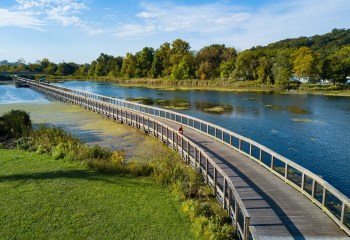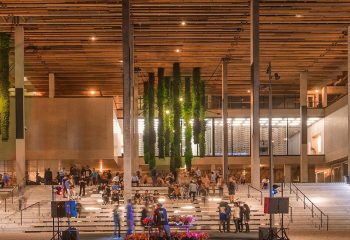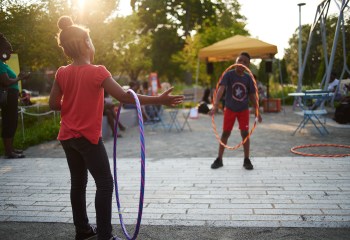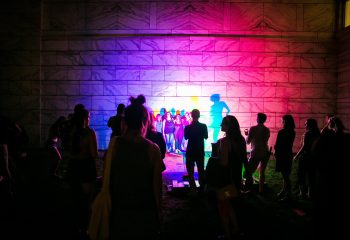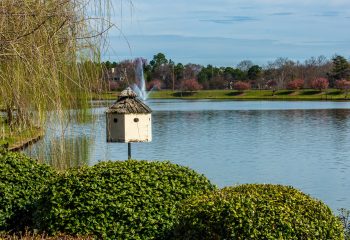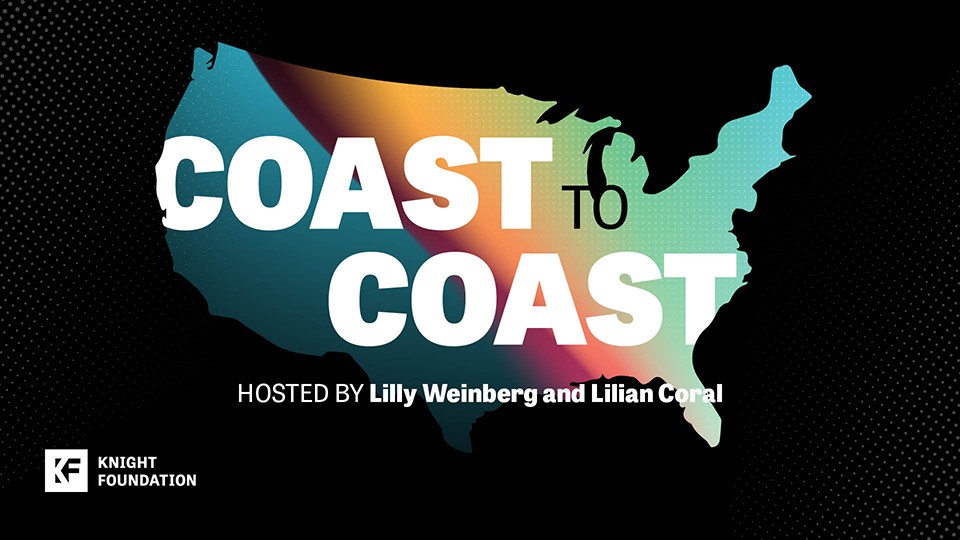To support the growth of Hello Beauté, an entrepreneur peer group built by and for female founders of color.
Program Area: Community Impact
Charlotte – (August 17, 2020) – A new groundbreaking study finds access to public spaces such as recreational areas drives deeper connections to communities, but in Charlotte more can be done to improve access to these amenities along racial lines.
The groundbreaking study commissioned by the Knight Foundation and conducted by the Urban Institute, “Community Ties: Understanding what attaches people to the place where they live,” shows that access to parks and safe spaces to live, work and play stand out among urban amenities that boost residents’ feelings of satisfaction and connection to their community. In Charlotte, the report found racial disparities in accessing these things.
Some key findings include:
- Local Charlotte data from the study shows that 59% of residents say recreational areas such as parks and trails are very important to them, and 83% feel they are easy to access. But there is also a racial disparity: Among residents of color, 78% feel they have easy access to recreational areas versus 86% of white residents. This echoes the national gap of 79% versus 88% respectively.
- Likewise, 87% of Charlotteans say safe places to live, work and play are very important, and 75% report easy access to them. However, that figure drops to 68% for residents of color. Nationally, about 77% of respondents reported easy access, including 69% of people of color.
“In Charlotte, and particularly in the West End neighborhood, we see vibrant public spaces as essential in the community“ said Charles Thomas, director for Knight Charlotte program. “However, we know we still have a ways to go to achieve equitable access to these amenities for all Charlotteans to enjoy.”
Conducted prior to the COVID-19 shutdowns, Community Ties leverages a survey of over 11,000 Americans residing in metro areas across the country — including Charlotte — to create one of the richest datasets on what drives attachment to place.
- Those with access to quality of life amenities such as arts, recreational areas and safe places to live, work and play reported a deeper attachment to their community, compared with those who had access to jobs, affordable housing, schools, health care or other desirable features.
- The Charlotte data reveals how attached local residents are to the city and where gaps in access exist across urban amenities. It offers points of consideration for such leaders such as — boosting time in center city, focusing on quality of life, paying attention to issues of equity — to strengthen residents’ ties to their communities.
As cities plan for a post-COVID-19 world and reckon with racial justice, the report provides knowledge for public officials and other community leaders to help make cities more resilient, urban public spaces more equitable, and think anew about how to build places where people want to live, work, play and stay.
To see how your city compares in different areas with other Knight communities and the national averages, go to our interactive website.
For interviews, please contact Tony Franquiz at [email protected] or 202-374-5393.
###
About the John S. and James L. Knight Foundation
Knight Foundation is a national foundation with strong local roots. We invest in journalism, in the arts, and in the success of cities where brothers John S. and James L. Knight once published newspapers. Our goal is to foster informed and engaged communities, which we believe are essential for a healthy democracy. For more, visit kf.org.
About Urban Institute
The nonprofit Urban Institute is a leading research organization dedicated to developing evidence-based insights that improve people’s lives and strengthen communities. For 50 years, Urban has been the trusted source for rigorous analysis of complex social and economic issues; strategic advice to policymakers, philanthropists and practitioners; and new, promising ideas that expand opportunities for all. Our work inspires effective decisions that advance fairness and enhance the well-being of people and places.
Image (top): Charlotte, NC by Jeremy Alford on Unsplash.
To support the public library transition to digital through the development of an integrated platform to purchase and lend e-books to patrons.
To support the launch of the Knight Foundation Fellowship in Healthcare Technology Innovation, a multidisciplinary, yearlong fellowship that immerses participants in the principles, skills and tactics used in developing new health care products and interventions.
This grant will support a nine-month plan to clean, program, and restore the Guadalupe River and Los Gatos Creek in cooperation with the GRPC, San Jose Conservation Corps, and TrashPunx. The Grantee will organize weekend volunteer clean up crews sourced from San Jose non-profits, local companies performing community service activities, and residents’ associations for people living near the park.
To support the Middle GA Regional Library Board Diversity Initiative, intended to increase the diversity and success of local, non-profit boards by providing comprehensive training for diverse volunteer leaders.
PHILADELPHIA – (August 6, 2020) – A new landmark study finds access to public spaces such as recreational areas drives deeper connections to communities for residents, but in Philadelphia more needs to be done to improve access to these amenities along race and socioeconomic lines.
Commissioned by the Knight Foundation and conducted by the Urban Institute, “Community Ties: Understanding what attaches people to the place where they live,” reveals that Philadelphia residents are more likely to stay rooted in their community over time than residents in other metro areas, and that they view access to parks and safe recreational spaces as very important.
Some key findings include:
- Local Philadelphia data from the study shows that 64% of residents say recreational areas are very important to them, and 87% feel they are easy to access. But there is also a racial disparity: among residents of color, 79% feel they have easy access to recreational areas such as parks and trails versus 92% of white residents. This echoes the national gap of 79% versus 88% respectively.
- Likewise, 87% of Philadelphians say safe places to live, work and play are very important to them and 72% report easy access to them. However, the racial access gap was even wider with only 57% of residents of color reporting easy access versus 81% of white residents. This represents a deeper divide than the national average (69% versus 83%) and highlights an issue that must be addressed.
“This report emphasizes what many of our communities have felt and experienced, and that there is both a need and desire for equitable and safe access to public spaces for all Philadelphians to enjoy,” said Ellen Hwang, director of Knight’s Philadelphia program. “It’s critical to engage and partner with residents to develop and reimagine public spaces that meet their needs for equitable development.”
Conducted prior to the Covid-19 shutdowns, Community Ties leverages a survey of over 11,000 Americans residing in metro areas across the country — including Philadelphia — to create one of the richest datasets on what drives attachment to place.
- Those with access to quality of life amenities such as arts, recreational areas and safe places to live, work and play reported a deeper attachment to their community, compared with those who had access to jobs, affordable housing, schools, health care or other desirable features.
- The Philadelphia data reveals where gaps in access exist across urban amenities and what local leaders might do to strengthen residents’ ties to their communities.
As cities plan for a post-COVID-19 world and reckon with racial justice, the report provides knowledge for public officials and other community leaders to help make cities more resilient, urban public spaces more equitable, and think anew about how to build places where people want to live, work, play and stay.
To see how your city compares in different areas with other Knight communities and the national averages, go to our interactive website.
For interviews, please contact Alise Murawski at [email protected] | 202-702-6903.
###
About the John S. and James L. Knight Foundation
Knight Foundation is a national foundation with strong local roots. We invest in journalism, in the arts, and in the success of cities where brothers John S. and James L. Knight once published newspapers. Our goal is to foster informed and engaged communities, which we believe are essential for a healthy democracy. For more, visit kf.org.
About Urban Institute
The nonprofit Urban Institute is a leading research organization dedicated to developing evidence-based insights that improve people’s lives and strengthen communities. For 50 years, Urban has been the trusted source for rigorous analysis of complex social and economic issues; strategic advice to policymakers, philanthropists and practitioners; and new, promising ideas that expand opportunities for all. Our work inspires effective decisions that advance fairness and enhance the well-being of people and places.
AKRON – (August 6, 2020) – A new landmark study finds access to public spaces such as recreational areas drives deeper connections to communities for residents, but in Greater Akron more can be done to improve access to these amenities along racial lines.
The groundbreaking study commissioned by the Knight Foundation and conducted by the Urban Institute, “Community Ties: Understanding what attaches people to the place where they live,” shows that access to parks and safe spaces to live, work and play stand out among urban amenities that boost residents’ feelings of satisfaction and connection to their community. In Greater Akron, the report found racial disparities in accessing these things.
- In the Akron metro area, 61% of residents say recreational areas are very important to them. While 91% of residents find them easy to access — well above the national average of 85% — that figure drops to 78% for non-white residents.
- Likewise, 86% of Greater Akron residents say safe places to live, work and play are very important, and 79% report easy access to them. However, that figure drops to 60% for residents of color. Nationally, about 77% of respondents reported easy access, including 69% of people of color.
“The Community Ties data is a call to action for Greater Akron to continue working collectively toward breaking racial access barriers for all residents to equally and safely enjoy parks, trails and other public spaces.” said Kyle Kutuchief, director for Knight’s Akron program. “The City of Akron, Knight and neighborhood leaders are working collaboratively to achieve this goal by investing in public space projects in the downtown corridor and creating them together.”
Conducted prior to the Covid-19 shutdowns, Community Ties leverages a survey of over 11,000 Americans residing in metro areas across the country — including Akron — to create one of the richest datasets on what drives attachment to place.
- Those with access to quality of life amenities such as arts, recreational areas and safe places to live, work and play reported a deeper attachment to their community, compared with those who had access to jobs, affordable housing, schools, health care or other desirable features.
- The Akron data reveals where gaps in access exist across urban amenities and what local leaders might do to strengthen residents’ ties to their communities.
As cities plan for a post-COVID-19 world and reckon with racial justice, the report provides knowledge for public officials and other community leaders to help make cities more resilient, urban public spaces more equitable, and think anew about how to build places where people want to live, work, play and stay.
To see how your city compares in different areas with other Knight communities and the national averages, go to our interactive website.
For interviews, please contact Alise Murawski at [email protected] | 202-702-6903.
###
About the John S. and James L. Knight Foundation
Knight Foundation is a national foundation with strong local roots. We invest in journalism, in the arts, and in the success of cities where brothers John S. and James L. Knight once published newspapers. Our goal is to foster informed and engaged communities, which we believe are essential for a healthy democracy. For more, visit kf.org.
About Urban Institute
The nonprofit Urban Institute is a leading research organization dedicated to developing evidence-based insights that improve people’s lives and strengthen communities. For 50 years, Urban has been the trusted source for rigorous analysis of complex social and economic issues; strategic advice to policymakers, philanthropists and practitioners; and new, promising ideas that expand opportunities for all. Our work inspires effective decisions that advance fairness and enhance the well-being of people and places.
To support the expansion of The Ocmulgee Heritage Trail.
Knight Foundation believes that an equitable and engaged community is one where diverse community members are attached to the place where they live and are invested in their community’s future. And we do this work in 26 cities across the country. One of Knight’s priorities is to accelerate existing momentum to revitalize downtowns and neighborhoods, with a particular emphasis on supporting engaging public spaces.
But how do we know what’s working and what’s not? What do we need to measure to show impact? Over the last several months, we’ve watched metrics daily, like COVID-19 case counts, for signals as to how our communities are faring. But we don’t have similar signposts for understanding how our communities are recovering, and what’s happening in our downtowns and public spaces. The need for metrics to understand downtown revitalization and public spaces have become even more relevant in context of COVID-19 and the racial reckoning our country is facing.
Today, we are publishing two reports that will practically help you address these important questions around measurement and impact. While these were commissioned long before the pandemic, we believe they will help communities determine what to measure during recovery.
The first report, “Measuring Progress Toward Downtown Revitalization and Engaging Public Spaces: A review of existing research,” is developed as a comprehensive literature review. This deep dive will help you understand how these topics have been previously studied and measured. The second report, “Toolkit: How to measure progress toward downtown revitalization and engaging public spaces,” turns that research into a toolkit. This distills the essential takeaways for anyone who works on measuring aspects of downtown revitalization or public spaces.
To get you started, a key first step is to define the goals within your community and what you hope to achieve. With this in mind, the following tips will help guide you in measuring impact:
- Measure the movement of residents, employees and visitors – This has likely changed a lot in your community during COVID-19. Even if you don’t have a baseline from before the pandemic, you can still start measuring this to understand your recovery.
- Be comprehensive and also evaluate equitable access – This includes measuring trends in employment, poverty, demographics, cost of doing business, the resident experience and the health of the business and housing markets. As you analyze these measures, assess equitable access to the benefits of revitalization, such as the number of minority-led and minority-run businesses and how that changes over time.
- Measure the quality of civic space and how much it is used – These kinds of metrics include diversity of users, potential for interacting with the space and with others, design features that support all users’ safety and comfort, users’ immediate perceptions of the space, the presence and strength of cultural assets in or near the space, the diversity of the surrounding business mix and how often the space is used.
- Measure indicators of people’s attachment to the place – People must want to be in and draw benefit from being in an area for revitalization to occur. You can understand how attached people are to a place by the things that tie them to a place (jobs, family); how they behave (purchasing a home, civic engagement); and how they feel about the place. For the 26 Knight communities, we also recently released the “Community Ties: Understanding what attaches people to the place where they live” study on attachment in our communities.
In these uncertain times, questions around the future of our downtowns and the equity of our institutions and spaces are more important than ever. As budgets are being cut, the report and toolkit helps give practitioners and city planners a clear idea of what to measure to know what works and what doesn’t. We hope this is useful and provides you with the right tools to make decisions for a more equitable and engaged community.
Lilly Weinberg is program director for community foundations and Ashley Zohn is director for learning and impact at Knight Foundation.
Photo (top) by Heidi Kaden on Unsplash
Two reports, “Measuring Progress Toward Downtown Revitalization and Engaging Public Spaces: A review of existing research,” and “Toolkit: How to measure progress toward downtown revitalization and engaging public spaces,” examine how to practically address important questions around downtown revitalization and engaging public spaces, from a comprehensive review of existing literature to a toolkit with takeaways to implement in communities.
AS COMMUNITIES ACROSS THE COUNTRY WORK TO REVITALIZE DOWNTOWNS AND NEIGHBORHOODS, WHICH METRICS INDICATE PROGRESS OR SUCCESS?
Knight commissioned Community Science to review existing research on downtown revitalization, equitable economic development and public space activation to investigate this question. While this work was commissioned before the COVID-19 pandemic and before the reenergized dialogue about addressing racial inequities in the United States, the question is vital as cities reopen and recover as vibrant, equitable hubs of social, economic and civic life. City leaders across the nation are simultaneously confronting two questions: how to recover and how to do so equitably. This report shares learnings about ways to measure success in both of those aims.
EXECUTIVE SUMMARY
To enhance efforts to revitalize downtowns and neighborhoods, Knight wanted a clearer under- standing about how best to assess the impact of these investments. That is, which metrics, according to experts, indicate that work to revitalize downtowns and communities is taking hold? These questions were raised before the COVID-19 pandemic occurred and before the current reenergized dialogue about addressing racial inequities in the United States began. They are now more vital than ever as cities begin to reopen and recover as vibrant, equitable hubs of social, economic and civic life.
Knight commissioned Community Science to conduct a review of existing research on downtown revitalization, equitable economic development and public space activation to investigate these questions. The purpose of this report is to share learnings about what to measure in order to support similar efforts, post-COVID-19 recovery and steps to eliminate racial inequities in United States cities.
The following conclusions emerged from the review of the literature. The first two synthesize strategies that cities commonly use to foster revitalization. The remaining four are what the literature tells us about how to measure these strategies.
- Seven well-known strategies emerged from past research as key drivers of revitalization. These strategies include creating and sustaining a busi- ness improvement district, promoting downtown through branding and marketing efforts, investing in a diversity of mixed-use developments, attracting and keeping businesses downtown, expanding employ- ment opportunities in the downtown or city center, creating and activating public spaces and imple- menting tax or other fiscal incentives.
- Many cities build and program public and civic spaces as a revitalization strategy, seeking to increase resident and visitor attachment to these places. Research suggests that the basic qualities that make a good place can be captured using four concepts: multifunctional spaces used every day of the week, inclusive and safe gathering spaces, attractive and comfortable places, and proximity to nature. For spaces to feel inclusive for all races, their design, including perceived safety features such as police presence and other surveillance, need to be carefully considered and balanced. These public spaces can then create a sense of place and place attachment among residents, who are motivated to protect, improve and take care of the broader place in which they live.
- Movement of people seems to matter (as residents, employees and visitors). One measure of successful revitalization includes measuring the flow of people in and around key focus areas. Post COVID-19, understanding how movement across a community is changing will be even more critical as cities work toward recovery—even if residents’ preference for density decreases.
- “Revitalization” should be measured comprehensively, looking at trends in employment, poverty, demographics, cost of doing business, the resident experience, the health of the business and housing markets, and with an eye toward whether benefits are distributed equitably. Interim progress measures should reflect a city’s unique strategies and desired short-term goals. They should also assess equitable access to the benefits of revitalization to help prevent displacement of longtime residents and businesses.
- Assessing civic space quality and a city’s progress toward activating those spaces is best measured with multiple indicators. Those include diversity of users, potential for interacting with the space and with others, design features that support user safety and comfort, users’ immediate perceptions of the space, the presence and strength of cultural assets in or near the space, the diversity of the surrounding business mix and how often the space is used.
- Individuals’ attachment to public or civic spaces is a critical step toward revitalization; people must want to be in and draw benefit from being in an area for revitalization to occur. Measuring progress toward increased place attachment, therefore, must be measured at tangible and psychological levels. Tangible evidence of place attachment include employment, property ownership and resident family members. Psychological indicators of attachment are positive memories and emotions, sense of belonging, positive self-esteem and positive health and well-being.
These findings are based on U.S. cities’ experiences over the last 20 to 30 years.A Under normal circumstances, these experiences would serve as a valuable guide for future revitalization work. The advent of the COVID-19 pandemic, though, makes these insights even more important. It is not yet clear how social distancing and mandatory closures will affect downtowns over the long term (e.g., will residents be afraid to travel to or live downtown? Will businesses lease less office space and allow their workers to work remotely? Will public events be possible, and if not, will businesses that rely on their foot traffic leave the downtown area?). Nonetheless, it is clear that this is
a moment for city leaders to take stock and prioritize recovery and revitalization strategies for the future. It is also the time to decide how these strategies will seek to address racial inequities in American cities.
There is value in looking to the past and adapting those lessons to the current reality. For example, knowing that people who feel connected to a place and to each other are more likely to stay and invest can inspire innovative strategies for fostering connections even within the constraints of COVID-19. Similarly, cities may prioritize supporting the recovery of their small independent retailers given their importance in creating vibrancy and drawing visitors and residents to the area. They may also seek to invest in small businesses owned by people of color to ensure they have the resources to thrive and support the communities in which they are located. The outcome measures highlighted in this report will continue to be relevant, though adaptations may be needed at times. For example, it will still be important to measure the quality of a public space but specific questions related to safety and comfort may need to be adapted to reflect social distancing.
Cities have been at the center of public health crises in the past and have found ways to adjust and thrive once more. With strategic and coordinated action by business and government leaders, this can again be possible. As leading global experts recently explained, “if the world’s cities find ways to adjust, as they always have in the past, their greatest era may yet lie before them.” With city leaders focused on addressing racial inequities, there is hope that this great era will include pathways for access and prosperity for all residents.

